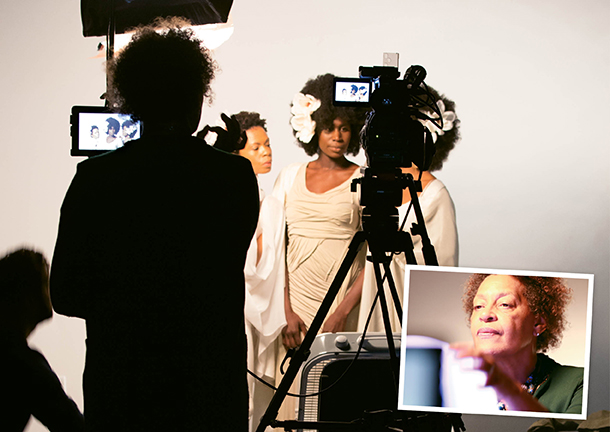 Carrie Mae Weems (inset and in foreground) directs dancers Bahiyah Hibah, Penda N’diaye, and Francesca Harper during a workshop of Grace Notes. Photographs (2) by Yao Xu, courtesy of Carrie Mae Weems May 27, 2016 Considering Grace Internationally acclaimed artist Carrie Mae Weems discusses Grace Notes: Reflections for Now, her Spoleto Festival USA production that premieres June 4 written by Jenny Ouellette When the Guggenheim Museum mounted Carrie Mae Weems’ 30-year retrospective in 2014, the photographer, videographer, and installation artist became the first African-American woman to receive such an exhibition within the institution’s walls. An amazing accolade, yes. But to be the first—in 2014? As critics noted, the milestone’s implications weren’t lost on an artist whose work often scrutinizes society’s underlying race and gender biases.
Weems, a MacArthur Foundation “Genius” and a recipient of the U.S. Department of State Medal of Art, first began documenting the world in the 1970s. In the early ’90s, she took her camera to Gullah communities along coastal South Carolina and Georgia, though since debuting that acclaimed Sea Island Series, the artist has yet to re-focus her lens on the Lowcountry. That changes this June, when Spoleto Festival USA presents Weems’ new multimedia production, Grace Notes: Reflections for Now. We spoke with the New York-based artist to learn more.
The impetus: Grace Notes grew out of another project I’d wanted to organize with a group of artists from various disciplines. The idea was that I’d ask each to contribute to a gift box I was putting together for President Obama to thank him for his service and mark his presidency. Soon I realized that it could be three-dimensional—the gift’s contents could live as a performance. So when Spoleto approached me about a project, I thought it was the perfect opportunity to bring these artists together and present a set of inquiries about the times in which we live.
Questioning: The work asks: what is the role of grace in the pursuit of democracy? This was famously and beautifully articulated during the bond hearing for the man accused of killing the Emanuel Nine, when a daughter of one of the slain spoke of forgiveness, saying, “I’ll never be able to hold her again, I’ll never speak to her again. But I forgive you, because I have something greater to do than to hold anger close by.”
The script: It moves between spoken word, poetry, and essay. Each day I’m trying to polish the narrative, asking and reconsidering how we can allude to some of the awful tragedies that have taken place over the last several years. I know that at the end of the day, there has to be light, effervescence, energy, and charge. So I’m shaping a narrative that takes us through the difficult terrain, but offers us a sense of possibility for the future.
Takeaways: I’m not interested in leading the audience in the mire, or leaving them clobbered. I want people to go home and ask themselves about their role in the larger social sphere, perhaps in the way they interact with a coworker or with a family member.
Spoleto musts: Seeing The Little Match Girl and Jason Moran’s performance. He’s phenomenal—an extraordinary pianist and conceptual artist.
On her awards: They give me the license to do the work to which I’m committed. They say, “She’s serious about what she does,” and being taken seriously for what one does is so important. Of course, it’s nice to be recognized; every once in awhile I go to a nice restaurant, put on a nice dress, and people say nice things about me. But my process hasn’t changed. I get up very early—always have—go to my office, and just get to work.
To read more articles from our June issue, click here.
To find a full Spoleto Festival USA schedule and ticket details, click here.
|
|
|
|

